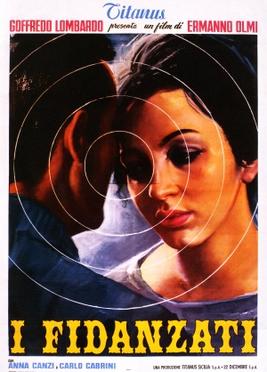A film capable of transfixing our gaze, fully demonstrating why Olmi is one of the great European auteurs
A work of rare power, depth and insight, capable of exploring the human soul while giving us a clear depiction of Italy during the boom
The third feature-length film written and directed by Ermanno Olmi, I fidanzati clearly demonstrates the central role occupied by the director among the great auteurs of European cinema. It is a highly poetic and extraordinarily expressive film. Few directors are capable of matching the clarity of Olmi’s vision, his ability to strip bare emotions and explore the frailties of man. Only the most distracted viewer could be fooled by the film’s simple and unassuming façade, and take it to be a “small” film: in reality, I fidanzati is a work of rare power, depth and insight. With touches of light-hearted comedy and ecstatic beauty, the film gives us a lyrical, clear and honest depiction of Italy during the boom. Along with Il posto, it is one of the films that best represents the renewal of Italian cinema at the start of the 1960s. American critic Kent Jones wrote: “In the images of this peaceful and indefinable film capable of transfixing our gaze, doubts and certainties seem to descend from the sky in equal measure.”
When Giovanni’s employers offer him the possibility of a transfer from Milan to Sicily to work at an oil refinery, he accepts, representing as it does an opportunity for rapid career progression. His girlfriend Luciana is less than pleased about his decision, which will call the future of their relationship into doubt. After she writes some emotionally intense letters, Giovanni feels that the moment has come to begin their love story over again.
A film capable of transfixing our gaze, fully demonstrating why Olmi is one of the great European auteurs
A work of rare power, depth and insight, capable of exploring the human soul while giving us a clear depiction of Italy during the boom
The third feature-length film written and directed by Ermanno Olmi, I fidanzati clearly demonstrates the central role occupied by the director among the great auteurs of European cinema. It is a highly poetic and extraordinarily expressive film. Few directors are capable of matching the clarity of Olmi’s vision, his ability to strip bare emotions and explore the frailties of man. Only the most distracted viewer could be fooled by the film’s simple and unassuming façade, and take it to be a “small” film: in reality, I fidanzati is a work of rare power, depth and insight. With touches of light-hearted comedy and ecstatic beauty, the film gives us a lyrical, clear and honest depiction of Italy during the boom. Along with Il posto, it is one of the films that best represents the renewal of Italian cinema at the start of the 1960s. American critic Kent Jones wrote: “In the images of this peaceful and indefinable film capable of transfixing our gaze, doubts and certainties seem to descend from the sky in equal measure.”
When Giovanni’s employers offer him the possibility of a transfer from Milan to Sicily to work at an oil refinery, he accepts, representing as it does an opportunity for rapid career progression. His girlfriend Luciana is less than pleased about his decision, which will call the future of their relationship into doubt. After she writes some emotionally intense letters, Giovanni feels that the moment has come to begin their love story over again.
